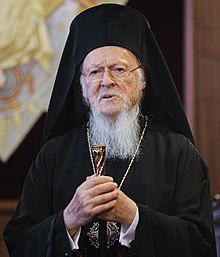
The leader of the world’s second largest Christian denomination has joined with the Roman Catholic Church in declaring the death penalty fundamentally incompatible with Christian teachings. In an interview with Vatican News on October 20, 2020, Ecumenical Patriarch Bartholomew of Constantinople, the head of the Eastern Orthodox Church, called opposition to the death penalty “the logical and moral consequence” of adherence to Christian principles of human dignity.
The Orthodox patriarch’s comments came during a visit to Rome for a prayer meeting for peace with Pope Francis. Asked for his views on the Roman Catholic pontiff’s recent papal encyclical, Fratelli Tutti: on Fraternity and Social Friendship, Patriarch Bartholomew praised the pope’s writings, saying “We completely agree with the call-challenge of His Holiness to abandon the indifference or even cynicism that governs our ecological, political, economic and social life in general.” The patriarch called on all people to work to create a world of “a united human family in which we are all brothers and sisters without exception.”
On capital punishment, Bartholomew said “[t]he attitude of a society toward the death penalty is an indicator of its cultural orientation and consideration of human dignity.” He said, “[t]he worthy system of European constitutional culture, of which one of the fundamental pillars is the idea of love as an expression of its Christian beliefs, requires us to consider that every man must be given the possibility of repentance and improvement, even if he has been condemned for the worst crime.”
“It is therefore a logical and moral consequence that one who condemns war also should reject the death penalty,” the patriarch said.
The Fratelli Tutti, published October 3, 2020 by Pope Francis, told Roman Catholics there is “no stepping back” from the Church’s opposition to capital punishment, Bartholomew called the encyclical “the crowning and happy conclusion of all social doctrine,” embracing the Christian values of “[l]ove, openness to the other and the culture of solidarity.”
Francis’ encyclical rejected the death penalty as a “false answer[] that … ultimately do[es] no more than introduce new elements of destruction in the fabric of national and global society” and called on “[a]ll Christians and people of good will” to work for “the abolition of the death penalty, legal or illegal, in all its forms.”
Cindy Wooden, Christian beliefs lead to opposition to death penalty, patriarch says lead to opposition to death penalty, Catholic News Service, October 20, 2020.


